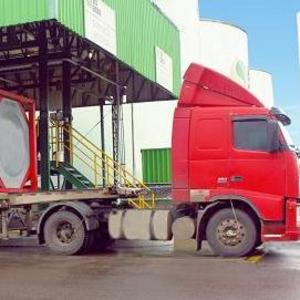Brazil biodiesel firm BSBios exports nation's first volumes to EU

Photo: BSBios
June 26, 2013
BY Ron Kotrba
Brazilian biodiesel producer BSBios, a joint venture between BSPAR and Petrobras Biofuel, has exported its—and Brazil’s—first commercial shipment of biodiesel June 25, the company stated. The first load of 22 tons (6,600 gallons) of biodiesel was sent to the Rotterdam Harbor, in The Netherlands.
CEO Erasmo Carlos Battistella, said the move is a great step towards opening the market. “There are many difficulties, with relation to taxes mainly, and cost Brazil that make negotiations difficult with the European market,” he said. “But this is an important advance we need to fulfill to demonstrate that Brazil can also export biodiesel.”
BSBios stated it became the first company in Brazil back in March 2008 to receive authorization from the National Agency of Petroleum, Natural Gas and Biofuels (ANP) to export biodiesel, but it waited to exercise the option, Battistella said, as it formed official partnerships in exporting to Europe.
The operation director of BSBios, Gabriel Machado, said that the price and quality of the product are important to conquer new borders. “This was just the beginning, the first drop of biodiesel, we want to conquer new markets,” Machado said.
Advertisement
Advertisement
BSBios produces approximately 90 MMgy.
Advertisement
Advertisement
Related Stories
Neste Corp. on July 24 released second quarter results, reporting record quarterly renewable product sales volumes despite weaker margins. SAF sales were up nearly 80% when compared to the first quarter of 2025.
Valero Energy Corp. on July 24 released second quarter results, reporting a profitable three-month period for its ethanol segment. The renewable diesel segment posted a loss, but the company’s new sustainable aviation fuel (SAF) unit operated well.
The IRS on July 21 published a notice announcing the 2025 calendar-year inflation adjustment factor for the Section 45Z clen fuel production credit. The resulting adjustment boosts maximum the value of the credit by approximately 6%.
U.S. Secretary of Agriculture Brooke L. Rollins today announced the reorganization of the USDA, refocusing its core operations to better align with its founding mission of supporting American farming, ranching, and forestry.
The U.S. Department of Energy’s Office of Energy Efficiency and Renewable Energy is soliciting public comments on a preliminary plan for determining provisional emissions rates (PER) for the purposes of the 45Z clean fuel production credit.
Upcoming Events










